Never Rarely Sometimes Always (2020): a teen abortion drama | un drama sobre el aborto adolescente
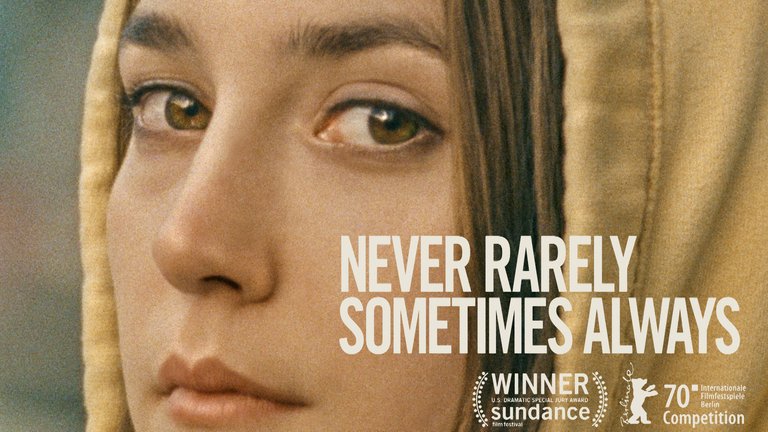
Many times, to escape the flat and repeated products of Hollywood production companies, people look to the other side of the world for a more honest, real and meaningful cinema. They review productions made in Iran, Japan, Russia, Sweden, Afghanistan and other countries in Europe and Asia, and although sometimes I do it too because I like international cinema, the truth is that you can find gems without leaving home because American independent cinema is a chest that hides many treasures.
Muchas veces, para escapar de los productos planos y repetidos de las productoras de Hollywood, las personas buscan al otro lado del mundo un cine más honesto, real y sentido. Revisan las producciones hechas en Irán, Japón, Rusia, Suecia, Afganistán y otros países de Europa y Asia, y aunque a veces yo también lo hago porque me gusta el cine internacional, la verdad es que se pueden encontrar joyitas sin salir de casa porque el cine independiente de EEUU es un cofre que oculta muchos tesoros.
One of them is the film Never Rarely Sometimes Always, written and directed by Eliza Hittman and starring Sidney Flanigan and Talia Ryder. It tells the story of Autumn (Flanigan), an apathetic, moody and very quiet teenager who lives in Pennsylvania. Although she works as a cashier in a supermarket, she isn't polite, she doesn't greet customers, she doesn't smile either there or at home where her parents don't seem to pay attention to her and her little sisters don't seem to get along with her either. That same thing carries over to high school and anywhere Autumn is present. And although someone comments in the film that this bad mood and silence are a normal phase in any teenager, the truth is that in her case it has to do with deeper wounds and more complex situations because after going to a healthcare center, taking a pregnancy test and an ultrasound, Autumn discovers that she's pregnant. Although it is not said in these words, we understand that it's an accidental pregnancy, and that Autumn doesn't feel ready to have a baby, which is why, after thinking about it a little, she decides to have an abortion. Any film that deals with abortion immediately raises the debate of whether it is right or not, in which cases it is more correct, of why not carry the pregnancy to term and give the child up for adoption (something that a woman at the health center suggests to the girl) and whether a 17-year-old teenager is mature and self-aware enough to make that decision.
Uno de ellos es la película Never Rarely Sometimes Always, escrita y dirigida por Eliza Hittman y potagonizada por Sidney Flanigan y Talia Ryder. En ella se cuenta la historia de Autumn (Flanigan), una adolescente apática, malhumorada y muy callada que vive en Pennsylvania. Si bien trabaja como cajera en un supermercado, no es cortés, no saluda a los clientes, no sonríe ni allí ni en casa en donde sus padres no parecen prestarle atención y sus hermanas pequeñas no parecen llevarse bien con ella. Eso mismo se traslada a la secundaria y a cualquier lugar en el que Autumn esté presente. Y aunque alguien comenta en la película que ese mal humor y ese mutismo son una fase normal en cualquier adolescente, la verdad es que en el caso de ella tiene que ver con heridas más profundas y situaciones más complejas porque tras acudir a un centro asistencial, hacerse una prueba de embarazo y un ultrasonido, Autumn descubre que está embarazada. Aunque no se diga con estas palabras, entendemos que se trata de un embarazo accidental, y que Autumn no se siente lista para tener un bebé, razón por la cual, después de pensarlo un poco, decide abortar. Cualquier película que trate sobre el aborto inmediatamente plantea el debate de si está bien, o no, de en qué casos es más correcto, de por qué no llevar a término el embarazo y dar la criatura en adopción (algo que una mujer del centro asistencial le sugiere a la chica) y de si una adolescente de 17 años es suficientemente madura y autoconsciente como para tomar esa decisión.

In Autumn's case, once she decides, we think it will be easy. Abortion is legal in the US and the girl begins to find out where to have it, but discovers that in Pennsylvania she needs the consent of one of her parents to be able to do it. Do not even think about it. Autumn is very reserved, shy and the possibility of confessing her pregnancy to her parents is too embarrassing and painful to consider, so after doing some research she makes the decision to travel to New York where she can have an abortion without requiring the consent of her parents.
En el caso de Autumn, una vez que se decide, pensamos que será sencillo. El aborto es legal en los EEUU y la chica comienza a averiguar en donde practicárselo, pero descubre que en Pennsylvania necesita el consentimiento de uno de sus padres para poder hacerlo. Ni pensarlo. Autumn es muy reservada, tímida y la posibilidad de confesar su embarazo a sus padres es demasiado vergonzosa y dolorosa para considerarla, así que después de investigar un poco toma la resolución de viajar a Nueva York en donde sí podrá abortar sin requerir el consentimiento de sus padres.
To go to New York you need time and money. Money for the bus ticket, for food, for any unforeseen event that may arise, so Skylar (Ryder), Autumn's cousin who also works as a cashier at the supermarket and who's a few years older, resolves the issue of money and decides accompany her to the big apple. With one suitcase for both of them, they wake up early and head to a huge city they don't know, with the address of a clinic written down on a piece of paper and hoping to finish as soon as possible to return home. But things are not so simple. It's true that abortion is legal, that it's not the taboo that it was a few decades ago and that there are clinics where a teenager can have an abortion without needing her parents' permission, but in Autumn's case, having an abortion is not like pulling a tooth. When she arrives at the clinic she finds out that her pregnancy is further along than she thought and that makes the procedure take longer. The girls must spend the night in an unknown city, without money and without knowing anyone. That is the central drama of the film, the time dilation that occurs from the moment Autumn makes the decision to have an abortion until she finally gets it done. You need to be firm in your decisions and be very brave to carry out an action like that when you have many things against you and a sea of doubts and fears fluttering in your head.
Para ir a Nueva York hace falta tiempo y dinero. Dinero para el boleto de autobús, para comer, para cualquier imprevisto que pueda surgir, así que Skylar (Ryder), la prima de Autumn que también trabaja como cajera en el supermercado y que es algunos años mayor, resuelve el tema del dinero y decide acompañarla a la gran manzana. Con una maleta para las dos, despiertan temprano y se van rumbo a una enorme ciudad que no conocen, con la dirección de una clínica apuntada en un papel y con la esperanza de terminar cuanto antes para volver a casa. Pero las cosas no son tan simples. Es cierto que el aborto es legal, que no es el tabú que era hace algunas décadas y que existen clínicas en donde una adolescente puede abortar sin necesitar el permiso de sus padres, pero en el caso de Autumn abortar no es como sacarse una muela. Al llegar a la clínica se entera de que su embarazo está más avanzado de lo que pensaba y eso hace que el procedimiento necesite más tiempo. Las chicas deben pasar la noche en una ciudad desconocida, sin dinero y sin conocer a nadie. Ese es el drama central de la película, la dilatación temporal que ocurre desde que Autumn toma la decisión de abortar hasta que finalmente consiga hacerlo. Se necesita ser firme en sus decisiones y ser muy valiente para llevar a cabo una acción como esa teniendo muchas cosas en contra y un mar de dudas y de miedos revoloteando en la cabeza.

Although most of Autumn's interventions are short and sharp phrases, she expresses herself at all times through her eyes and gestures. You can see and feel the fear, the disappointment, the rage, the shame, everything, in her face and that is not a minor merit for such a young actress who embodied very well the character constructed wonderfully by Eliza Hittman, who also did an incredible job conceiving and creating the atmosphere of the entire film.
A pesar de que la mayoría de las intervenciones de Autumn son frases breves y cortantes, en todo momento se expresa a través de su mirada y sus gestos. Se puede ver y sentir el miedo, la decepción, la rabia, la vergüenza, todo, en su rostro y ese no es un mérito menor para una actriz tan joven que encarnó muy bien el personaje construido maravillosamente por Eliza Hittman, quien también lo hizo increíble a la hora de concebir y crear la atmósfera de todo el film.
Never Rarely Sometimes Always takes place in a misogynistic and frightening society for women, especially teenagers. Perhaps such violent events do not occur, but the shadow of sexual, verbal, physical and psychological abuse against women is felt at all times. At a cinematographic level, the camera focuses on the girls, on their faces, their walk, their movements and not on the landscape or the surroundings. The shots taken from that closeness make one feel like the third passenger on the bus or like someone else sitting in the waiting room; and that is reinforced by the fact that many shots are taken in motion. It's not just that we see them walk, it's that we walk with them. Finally, the script is so honest and the story feels so real that it's not maudlin despite its emotional nature (the interview with Autumn in the clinic, before her intervention, is a sad and painful scene because We know that there are millions of girls who have gone through things like those she confesses) nor does she denounce or take sides for or against abortion. It just shows things as they are. The Romanian 4 luni, 3 saptamini si 2 zile (4 Months, 3 Weeks & 2 Days) and the French L'événement had the most dramatic feature of the clandestine practice of abortions, due to an issue of time and society, but Never Rarely Sometimes Always is equally powerful and dramatic, even if they are other times, more legal and open, have any of you seen this movie? I read you in the comments.
Never Rarely Sometimes Always transcurre en una sociedad misógina y atemorizante para las mujeres, en especial las adolescentes. Quizás no ocurran hechos tan violentos, pero la sombra del abuso sexual, verbal, físico y psicológico en contra de las mujeres se siente en todo momento. A nivel cinematográfico, la cámara se enfoca en las chicas, en sus rostros, su caminar, sus movimientos y no en el paisaje ni en los alrededores. Las tomas hechas desde esa cercanía hacen que uno se sienta como el tercer acompañante en el bus o como alguien más que se sienta en la sala de espera; y eso es reforzado con el hecho de que muchas tomas son hechas en movimiento. No es sólo que las veamos caminar, es que caminamos con ellas. Por último, el guión es tan honesto y la historia se siente tan real que no resulta sensiblera ni melosa a pesar de lo emotiva (la entrevista que le hacen a Autumn en la clínica, antes de su intervención, es una escena triste y dolorosa porque sabemos que hay millones de chicas que han pasado por cosas como las que ella confiesa) ni tampoco denuncia o toma partido a favor o en contra del aborto. Simplemente muestra las cosas como son. La rumana 4 luni, 3 saptamini si 2 zile (4 Months, 3 Weeks & 2 Days) y la francesa L'événement contaban con el plus dramático de la práctica clandestina de los abortos, por un tema de época y sociedad, pero Never Rarely Sometimes Always es igualmente poderosa y dramática, aunque sean otros tiempos, más legales y abiertos, ¿alguno de ustedes ha visto esta película? Los leo en los comentarios.
Reseñado por @cristiancaicedo
Other posts that may interest you | Otros posts que pueden interesarte:
  |
|---|
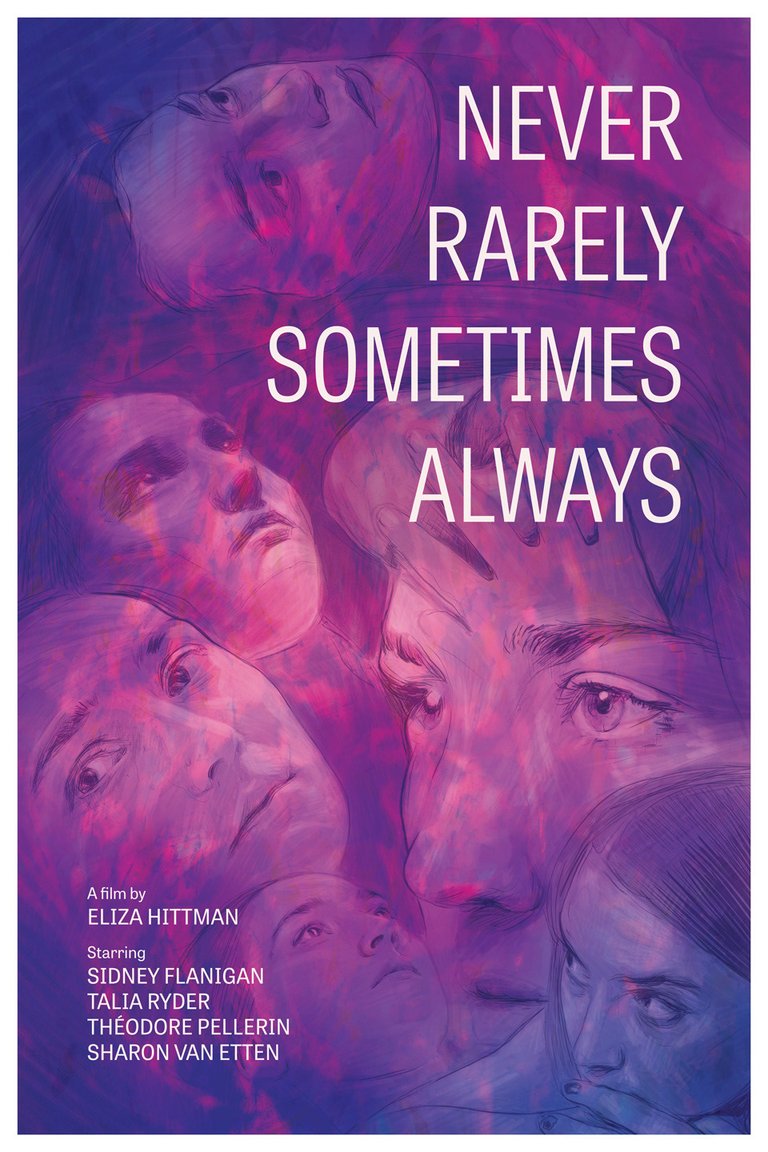
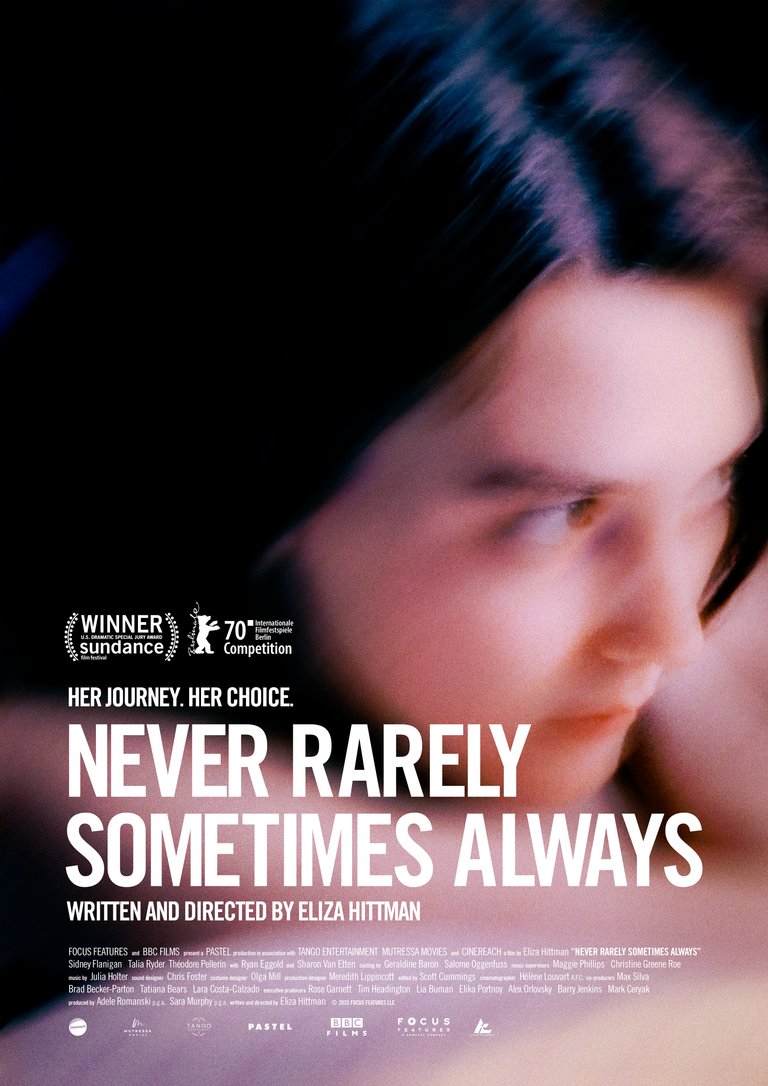
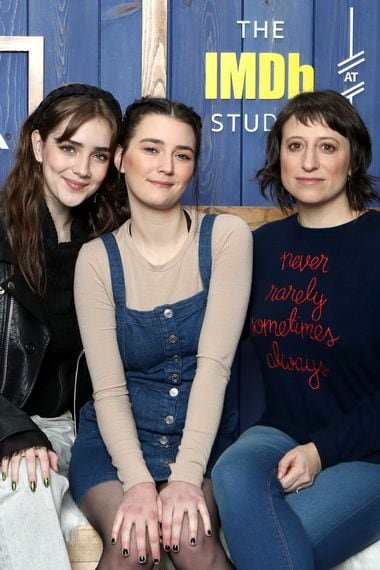
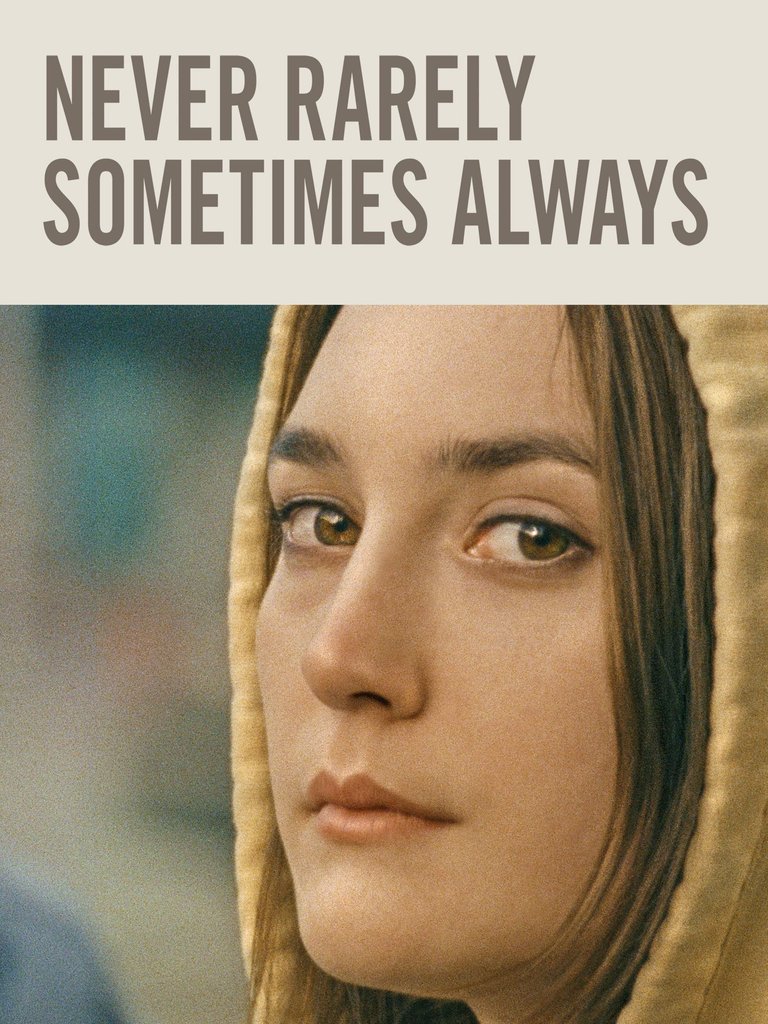
Buen resumen, suena bastante interesante esta película, la apuntare en mi lista.👍
Such a nice movie i think i might love to catch a look
Keep up the good work. 👏
Recognized by Mystic artist Gudasol
You are loved.
Interested to to help music map cXc.world spread more good vibes on Hive?.